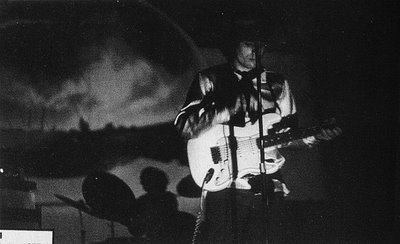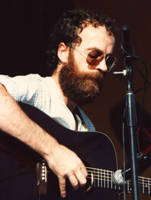

Unfortunately, the past couple of days have seen the deaths of a pair of musicians who left indelible stamps on their respective genres. The first, Syd Barrett, was a prominent musician in England's burgeoning psychedelic scene in the mid-1960's. He named his band Pink Floyd, after his favorite bluesmen Pink Anderson and Floyd Council. Barrett sang and played guitar, and wrote most of Pink Floyd's early material, including the first two singles "Arnold Layne" and "See Emily Play" and much of their 1967 debut album The Piper At The Gates Of Dawn. Barrett mixed spaced-out imagery in songs like "Astronome Domine" with naive, childlike sentiments in songs like "Bike." The playful whackiness of his music had its appeal, but it came at a very heavy price. In hindsight, Barrett most likely would have faced serious mental issues even without the LSD, but the combination of psychological imbalance and copious amounts of hallucinogens proved disastrous. By the end of 1967, Barrett was barely playing a note on stage, and the rest of Pink Floyd brought in David Gilmour to fill in the gaps. Within a few months Barrett was gone for good. Roger Waters assumed the role of the band's chief songwriter, and Pink Floyd eventually became one of the world's biggest and best bands. Barrett, despite leaving his mark not just on Pink Floyd but on subsequent performers like David Bowie, R.E.M., and Robyn Hitchcock, managed to record two solo albums before retreating entirely, spending most of the rest of his life in his mother's house and making very little contact with the outside world. He has always maintained a cult following buoyed by the air of mystery surrounding his life, but he was one of rock's tragic figures long before he passed away this week at age 60, due to complications from diabetes.
The other musician who passed away this week was not as well known to rock audiences as Barrett, but was a legendary figure in Irish traditional music and had a greater, and more direct, impact on me personally. Like most young traditional Irish musicians coming of age in the late sixties and early seventies, Mícheál Ó Domhnaill (pronounced MEE-haul O'Donnell) felt the pull of rock music, citing Fairport Convention and their lead guitarist Richard Thompson as major influences. He cut his musical teeth in a highly regarded but short-lived outfit called Skara Brae, which also featured his sisters Tríona and Maighread Ní Dhomhnaill and fellow guitarist Daithi Sproule, who now plays with Altan. Mícheál and Tríona had bigger things in store for them, however; in 1975 they teamed up with Donal Lunny, Paddy Keenan, Matt Molloy, and Tommy Peoples to form The Bothy Band. Despite a brief four years of existence, the Bothy Band are widely regarded as the very best and most influential of all the Irish traditional bands. Ó Domhnaill's guitar and Lunny's bouzouki supplied the band with an energetic, driving, heavily rock-influenced rhythm, the likes of which had never been heard on any traditional Irish recording before. Ó Domhnaill also co-produced the Bothy Band's albums and sang a handful of songs, the most notable of which was "Fionnghuala," a short, rapid a capella pice of Gaelic mouth music. Featuring frenetic alliteration and unique harmonies, it became an instant classic. After the Bothy Band's breakup, Ó Domhnaill moved to Portland, Oregon and participated in a number of different projects, including the bands Relativity and Nightnoise with his sister Tríona. Before a Nightnoise concert in 1994 at the now defunct Bottom Line in Manhattan, I spent close to a half-hour in conversation with Mícheál Ó Domhnaill. Among other things, this was the first conversation I ever had with a recording artist. I had only recently discovered the Bothy Band at that time and didn't really know anything about Nightnoise, but he happily indulged all of my questions about his past, and left a lasting favorable impression with me. Mícheál and Tríona returned to Ireland in the late nineties. I kept waiting to hear of new work from them, and secretly hoped that I would live long enough to see a Bothy Band reunion concert, but I guess that won't happen now. Mícheál Ó Domhnaill was found dead after a fall in his home on Saturday. He was only 54.



No comments:
Post a Comment